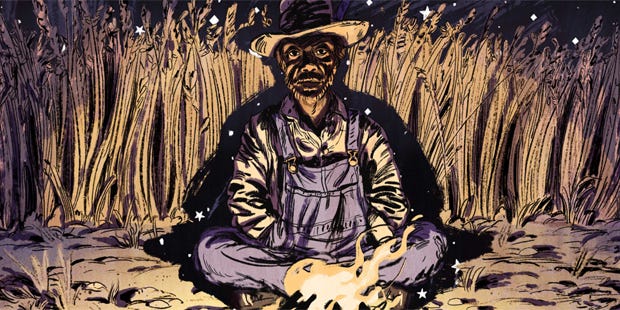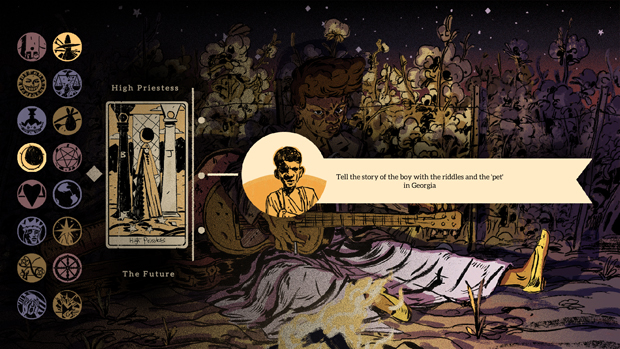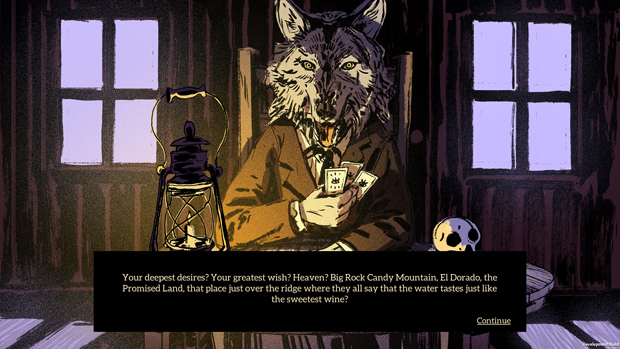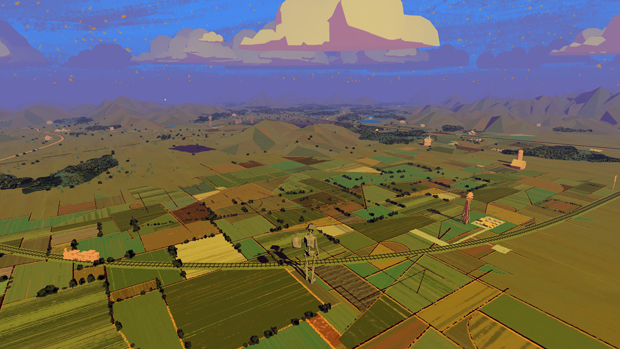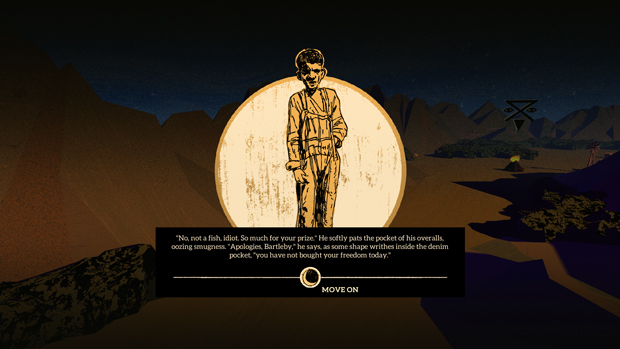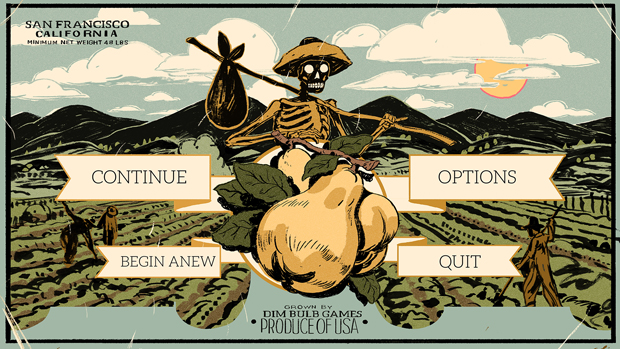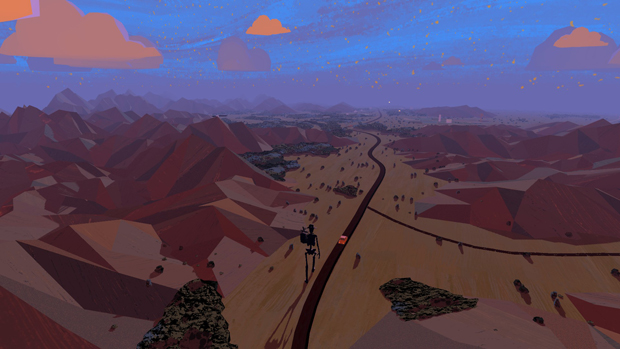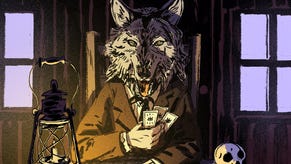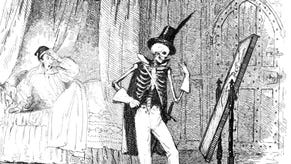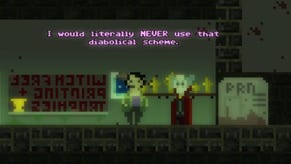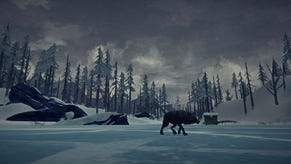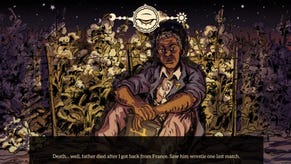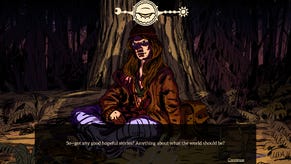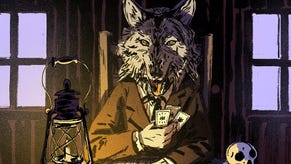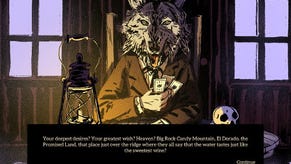The 'shining lie' at the heart of Where The Water Tastes Like Wine
Telling the myth of America
Where the Water Tastes Like Wine [official site] is a game about folk tales. It's an anthology of sorts and brings together different writers as they pen characters to inhabit a difficult land. There's this gloriously intense illustrated style which works alongside the soundtrack to give me chills every time I see the trailer or visit the website. I've included that trailer after the jump so you can see what I mean, but there's also a fabulism there – dark dreams and transformations are the game's hallmarks.
I played a tiny slice at GDC earlier this year with developer, Johnnemann Nordhagen, peeping over my shoulder. Nordhagen was a co-founder of Fullbright but he's now creating Where The Water Tastes Like Wine under the aegis of Dim Bulb Games. The aesthetic was so evocative and so unusual in a game setting that we've been exchanging emails to talk more about it. An art feature is coming but before we get to that we needed to talk about folklore, the myth of America and the way stories repeat and recombine.
The game itself features a cast of characters whose stories form a kind of bleak American anthology as well as an exploration of how folk tales are these fluid things with life cycles of their own. With that in mind the exact form of the game's content is influenced by what the individual writers for each character are interested in. But Nordhagen is the point from which these commissions and ideas initially flowed and his vision of the game is the unifying element.
Given the game's music, art and philosophy all seem so tightly bound to one another I ask what he was surrounding himself with as he worked on the game.
"After Gone Home shipped, I took some time to figure out what was going on next for me," he says (Nordhagen was the sole programmer on Gone Home). " I had always wanted to travel a bunch, but had never really had responsibility-free time to do so. So I spent six months backpacking around the world, trying to travel as much as possible over land and by boat. I was also tossing around ideas for what sort of game I might make - I wanted to make something that was my creation, since my whole career to that point had been working on other people's ideas."
On a train in the middle of Siberia was the point at which he decided a game about travelling was in order. The aim was "to try to capture the trading of stories and experiences that you get with fellow wanderers". Friends have ridden the Trans Siberian Railway and I remember them talking about the experience of various kinds of sharing with fellow passengers. Same with the long journeys on American rail networks. It's a very different type of travel to most train rides in the UK – expansive and potentially beautiful and with a lot of time to kill.
"I've also long been a fan of American roots music - bluegrass, blues, jazz, folk, and I was listening to a lot of that. I love the world described in those songs - lonely wanderers, unlucky gamblers, run-ins with the Devil, murder ballads, criminals, hard workers oppressed by the bosses - and I felt like a game where you got to explore that kind of world would be a great thing to tackle," he adds. "From there it's a quick jump to the Great Depression, hobos and labor unrest, and I decided to kind of take the mythical and fantastical worlds that are contained in American folk songs and stories and wrap them around that period of history. And both because of the time period, and because of the general mood of this genre of music, it needed to have a real sense of sadness, of tragedy and struggle."
Combining the two takes you towards the folk tradition where stories and songs get shared and recombined. "If you listen to this music you start to hear the lines borrowed from one place or another, and you can see them crop up again and again. That's part of where the title of the game comes from - it's a line from various songs stretching back into the mists of folk history."
He shares me in on a playlist which swells and agitates around the "high lonesome sound". I listen to Sweet Emma Barrett, Phil Ochs, John Lee Hooker, Lead Belly, Pete Seeger…
"I started making lists of the sort of characters one might encounter as a wandering storyteller. And I started reading a lot of books and watching a lot of movies and TV about the era and about these sort of characters. Coal miners in the mine wars, the kids sent out to fend for themselves during the Great Depression, sharecroppers, Pullman porters - I read a lot of books! But it also started becoming clear to me that while I could do the research on this, I wouldn't be the best person to tell all of these stories. I'm not the right person to write about the spread of black culture out of the south after the Civil War, or about the Long Walk of the Navajo. And I'm also just not a professional writer!"
That's the point at which the game eased into being this anthology. As far as I understood it the stories were these distinct characters you encountered as you played, but I was interested in whether Nordhagen had tried to soften those edges between characters by passing them around in the manner of the folk music and lore we'd touched on already.
I ask whether he was tempted to run them through that prism of other people's retellings and reshapings to see which parts stuck around.
"It seemed tough to do that with some of the stories that people were writing, and some of the historical backgrounds we were investigating," he replies. "The story of the army of veterans who marched on Washington during the Great Depression, or the idea that the US military had dropped bombs on coal miners, or the forced relocation of the Navajo - turning them into legends didn't feel right, both because they were real tragic history and also because they were such good stories to begin with."
Instead the player is the story collector. You take on the job of the personification of folklore after losing a poker game with the wrong entity and thus it's your responsibility to pass these stories from place to place. Nordhagen refers to it as a Greek myth/Terry Pratchett kind of idea – "there's an actual person responsible for doing this, for spreading tales and watching them grow. And also that this is a necessary function, so that the Idea of America can persist, through these stories. Basically that America is more a myth than anything else, and what kind of myth it is is determined by the stories you're spreading."
We'll get to America as a myth properly in time but first let's go back to the game's title. When I first heard it it sounded familiar in that way where it felt like a quote I could never quite attribute – maybe a bible verse or a legend or… some other established shape in a shared consciousness which we voice in variations over centuries.
"It was a line I knew from a song, originally, and then one day many years ago I was reading 'Sometimes A Great Notion' and there it was again, the same line. I started digging around to find out which had come first, the book or the song, and I found out that the history of this phrase, "where the water tastes like wine" just goes back forever, and has been passed around from place to place in a very folk-culture manner.
"Actually, when I was doing research for the game I read this book by Zora Neale Hurston, called Mules and Men. It's about her journey back to where she grew up to collect the folklore and stories of the people around there. And then just casually in the middle of this book a person talks about 'Polk County, where the water drinks like cherry wine' and I basically fell out of my chair. I looked it up, and Polk County is immediately next to the county where these poor, powerless black folks are having this conversation, and that also really struck me - the idea that such a place can be so close, the important thing is that it's inaccessible. The next county over can be mythical, if you can't get there easily!"
Vignettes make up a lot of Where The Water Tastes Like Wine. The emphasis isn't on the outcome of actions exactly, but on what kind of story you get as a result:
"You might make choices that lead to this being a love story, instead of a tragedy. Or a story about traveling, instead of a story about memories. The player collects those stories, and that's your currency for talking to the characters - you trade them a story about love, and in return they tell you something about love from their own life or experience."
As the folklore personification tells and spreads these tales the idea is that you'll hear them back but altered as if you're playing a longer-form version of Telephone and you can scoop those into your collection too.
"We have a story about buying a violin from a family, although the girl who owns the violin is violently opposed to this idea. You can tell that story, and then it'll grow larger. When you hear it back it might be about a violin that could only be played by the true owner. Or about a cursed violin, forever haunted by the ghost of the original violinist."
But to go back to the specific characters, "You can also tell the life stories of the people you meet, but those are sort of treated as inviolate - they're True stories, and that's more valuable to you in your role, and to the myth of America."
The idea of other people influencing the character stories does come up but it's in the form of Nordhagen offering a kind of multimedia mood board to the authors to guide the process a little. To take the character of Ray, the basic idea was that he was a cowboy mourning the death of the Wild West but that would then get refined via movies like Hell or High Water and Dead Man and Butch Cassidy and the books of Cormac McCarthy and Nordhagen would try to distill that sense into stories and references and feelings.
"Jolie Menzel wrote Ray - she's a narrative designer at Ubisoft and has worked at Telltale and she's great at this," he says. "She took my interpretations of that period and McCarthy and all the rest and created this character from it, with her own twists and additions to who he is, fleshing him out as a real person.
"It turns out he's not just mourning the death of the West in some abstract way, but that it's specifically related to the encroachment of Federal land and the way big swathes of the desert were turned into testing grounds for nuclear weapons. He's partly this tragic poetic figure, partly a libertarian asshole, and partly an eco-terrorist. It's wonderful because I can see the shape of the character as I envisioned him, but it's changed and grown and become deeper and richer through her interpretation."
For me there also the idea than an audience will feed into this cycle of sharing and reshaping if they tell friends about what they're playing.
But to return to the idea of America as a myth, it's a way of thinking about the United States which I'm familiar with in some sense but I always come to it as an outsider. I can read about elements which represent bits of it – these sweeping and problematic doctrines like manifest destiny – or see the emotional sway that words like veteran exert but I'm not part of the nation which formed from that particular set of ingredients and convulsions and politics.
I tell him that I'm ambling towards a question that I don't quite know how to ask but it's something like "How does the myth of America feel to you at the moment and has that changed as you worked on Where the Water Tastes Like Wine?" And that's if it even feels like anything to start with.
"Oh gosh, yes. A lot has changed recently for us, hasn't it?" he replies. "It's terrible. And looking back on this history, being steeped in this, it only makes me realize that America is really repeating the mistakes of the past again and again. That the same themes are coming up, and have been for a while.
"This game has always been about struggle, and about how there are people on the edges of society that get left behind or mistreated. All of the characters the player meets fit into that category. And that struggle to not be crushed by the mainstream, by the government or by your fellow citizens - I mean, I think we're wrestling with that now in a huge way.
"When I read about Reconstruction, and the way that black sharecroppers were treated in the south - they weren't slaves any more, technically, but they immediately got taken advantage of by these payment schemes that kept them in debt forever. And you can look around now and see the same tools being used, the same economic bondage, and realize that few people ever really escaped that.
"The same with the way the Navajo and really all natives were treated - Standing Rock and the rest is just a continuation of policies that were put in place long ago. The way Dustbowl refugees were turned back at the border to California. The bracero program that brought in farmworkers from Mexico only to lead to the horrible and racist "Operation Wetback" to deport them and their descendants.
"One theme that came up with a lot of these characters is political and social solidarity, though. I wasn't intending this game to be overtly political - I wanted to represent these stories and these people, but it turns out the Unions and similar structures were huge centers of power and really the only way people were able to fight back against these oppressions. Many of the characters represent organized labor of one sort or another, and others belong to ad-hoc political blocks that got power through their numbers.
"Anyway, I guess what I've seen while researching this game is that the myth of America has always been 'a shining lie' as one character calls it. I mean I knew that going in, and as a white man I'm already shielded from a lot of the history that would have pierced that lie. But I think that now, maybe, that lie is unraveling a bit. And I think it's partly due to people sharing their stories more effectively. We can see that 'the American Dream' was only available to a certain kind of person, and usually it wasn't even available to them."
But in keeping with the ubiquitous-but-ephemeral phrase Where The Water Tastes Like Wine, paradise isn't a single place, it's a thing you glimpse in these valuable, transcendent moments during a regular, dreary life.
"I do gather hope from these times in the past, from immigrant and black miners joining the mine strikes instead of scabbing, from the Sharecroppers' Union and the Brotherhood of Sleeping Car Porters, the Bonus Army, and things like that," says Nordhagen.
"I see these times when people were able to make their lives better, to win and to get closer to The Dream."
Where The Water Tastes Like Wine is due out later this year.
Disclosure: Regular RPS contributors Cara Ellison, Leigh Alexander and Emily Short have all written for the game.
